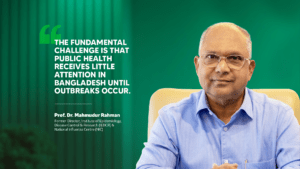1. Let’s start with the inspiration behind launching The Front Page, was there a specific experience or motivation that drove you to start this media platform?
Fasbeer Eskander, the Co-founder and Publisher of The Front Page
The inspiration behind launching The Front Page came about in an interesting way. I actually met Akib Mojumdar, Co-founder and chief editor of TFP in a rather funny and unexpected way. I met him when he applied as a volunteer at Footsteps, where I am the Head of Operations, and from there, we started working together. We became close and started sharing ideas. That’s when we realized we have similar mindsets, especially when it comes to business and what we want to achieve for Bangladesh and its people. He has a really active business mind—he’s always bouncing ideas off of me. In 2020, he suggested this idea for a platform like The Front Page, and I immediately thought it was a great idea. We both agreed this was something we could get behind, and that’s how it all started. We brainstormed and eventually settled on the name.
Shah Md. Akib Majumder, Co-founder and Chief Editor of The Front Page
For me personally, The Front Page was also driven by the lack of freedom of speech we’ve experienced for almost 17 years. There was no space where people could openly express themselves or voice their opinions without fear. I wanted to create something where anyone could speak up, knowing they’d be safe while doing so. As we developed the idea, we noticed that many news stories lacked factual accuracy—there was too much fake news floating around. So, our initial tagline was “Your daily informant with sources verified.” We focused on curating reliable news that people needed to know, narrowing down thousands of stories into the highlights.
I’ve always had the habit of reading newspapers, and one day while reading, I thought about what they call the first page of a newspaper—the name “Front Page” clicked instantly. Before that, we tossed around a lot of name ideas, but The Front Page just fit perfectly. It started with just two of us, and our first story was about the PS5, which was being sold for an outrageous price in Bangladesh—1,15,000 taka, when the actual price was only around $500. We targeted the gaming community with that story, and it really blew up. The reach and engagement were incredible.
Soon after, Imtiaz Wasif joined us as our Business Development Manager, followed by Sumaiya Rahman Apu, who became our Brand and Outreach Manager. We quickly became a four-person team, and we designed it in such a way that if one of us was unavailable, the others could pick up the slack. In the early days, we didn’t have the capacity to pay salaries or recruit more team members. I remember designing a news story on my phone while on an Uber bike—there was a huge traffic jam caused by a gas cylinder explosion, and I put together the news on the go. We created almost 1,700 designs ourselves during that period. Eventually, we realized there was real business potential here, even though we never initially thought of it as a way to make money. We were simply working in the present, doing what felt right.
Fasbeer Eskander
We started The Front Page because of a cause, not because we saw a business gap. We wanted to reach the new generation, especially Gen Z, who don’t really read traditional newspapers. We wanted them to know about the relevant things happening around them. Honestly, it started as something fun, and we decided to keep it anonymous. For a long time, even our family, siblings, and friends didn’t know we were behind it. By the end of 2021, we had 80,000 followers, and by 2022, we crossed 100,000, all through organic reach. It was all about providing quality content that people appreciated.
In Bangladesh, most businesses start with the support of friends and family, but for us, it was just pure passion and interest. Staying anonymous helped us, especially since we didn’t have the freedom to speak openly. We were the first and only portal in Bangladesh to cover the release of the documentary All The Prime Minister’s Men by Al Jazeera and had the security of anonymity, which gave us the freedom to report without fear of backlash. Our goal was always to be the daily informant—providing verified, factual, and unbiased news.
Something that started out as fun has now become something much bigger, something we both dreamt of. We never imagined we’d come this far, especially during significant moments like the student movement. During the blackout, I was the only one outside Bangladesh, when everyone else was inaccessible. I had to learn how to design content on my own, find and vet any news I could find, and ensure timely posts all by myself. 3 days later, I was able to create an international team full of dedicated people who then helped me conduct our activities. It was tough, but we made it work. When you’re doing something for a good cause, Allah ensures things fall into place, and that’s exactly how it felt for us.



2. Walk us through the types of news and coverage featured on your platforms. Also, could you provide an overview of The Front Page and the kinds of content you focus on?
Shah Md. Akib Majumder
When we first thought about The Front Page, the editorial policy came together naturally. We wanted to create a space where the news that truly deserved to be on the front page, the kind of news that needed to be highlighted for the benefit of the country’s people, could be showcased. So, we started curating our content with this in mind. We always consider the national interest—like the floods that happened in Feni. Sometimes, there’s news that mainstream outlets don’t cover. For instance, there was a viral post on Facebook about an event that didn’t get any mainstream coverage. We dug into it, collected the facts, and created a report. Soon enough, mainstream media started picking up the story from our report. Even TV channels began citing us. We’ve always aimed to bring the most important news to people’s attention in a way that resonates with them. That’s how our editorial policy took shape.
I remember on July 15th at Dhaka University, the first protest march erupted around 1:00 or 1:30 AM with chants of “তুমি কে, আমি কে, রাজাকার রাজাকার”. No one expected to be working that late, but when I saw what was happening, I immediately told our editor, Nipun Afridi. He informed the team, and we all worked together to gather videos and design content. We published the footage in real-time, and it got an incredible reach. From that night until the blackout, we worked non-stop. Being an alumnus of BRAC University, I also covered the intense protests happening on our campus. The atmosphere was heavy as people were carrying the bodies of fellow students. It was chaotic, but we knew it was vital to report everything, to highlight what people needed to know. We faced risks, and we know we’ll face more in the future, but it’s something we have to do. That’s our commitment.
Fasbeer Eskander
For me, this was our way of standing with the students, even though I was abroad. Working on The Front Page allowed me to support the movement from a distance. Raising awareness and spreading verified accurate information is as important as being out on the streets, especially when access to it becomes difficult. At that time, getting accurate information was challenging with so much happening. For us, The Front Page became more than a business—it became a cause. Once we hit 10,000 followers, we started recruiting designers and moderators. It was an exciting time, and our anonymity/anonymous communication added a bit of fun to the process.
Shah Md. Akib Majumder
In 2021, we didn’t have any real plans for monetizing The Front Page, but as we grew, we realized there was business potential. I knew that I needed to step out from behind the scenes since we needed business registration and had to start speaking with clients. It became clear that clients wanted to work with us, and our growth was evident. We started to pay our designers small amounts, and I felt it was necessary to become more public to push the business forward.
Fasbeer Eskander
It was funny because when Imtiaz and Sumaiya were acting as the public faces of The Front Page, people were always wondering who the anonymous founders were. Even within our team chats, I would sometimes act as a moderator alongside the others. When we officially transitioned into a business, we structured everything more formally.
Now, our team consists of four management members and two editors who oversee all content. We, as the management, don’t interfere with the editorial side to ensure objectivity. Our editors browse, select, and communicate with the design team, which operates around the clock. Imtiaz handles most of our PR, while Akib and I focus on business expansion and staff management. We stay out of day-to-day content operations, so the editorial team can function independently and offer their unbiased opinions. Our assistant editors, Nipun Afridi and newsroom editor Khaled Saifullah Juwel manage the entire content process.
Shah Md. Akib Majumder
I still remember once, when both Imtiaz and Sumaiya were unavailable for a meeting, I had to step in and attend as an employee. It was an interesting experience. Our editorial board remains independent, and sometimes I don’t even see the news until after it’s published.

3. Why do you think online news portals like yours are essential in today’s media environment, especially when compared to traditional news outlets?
Shah Md. Akib Majumder
I feel like the biggest issue in the media industry today is the lack of trust. Worldwide, fake news is rampant, and in Bangladesh, it’s no different—there’s a lot of propaganda. Even the most circulated newspapers in the country are often controversial and sometimes even the most hated. People witness something on the streets, but the next day, the newspaper will publish a completely different version of the event. That’s how the trust gap has grown.
In response to this, we’ve seen a lot of local online portals and smaller newspapers pop up in different regions. The problem, though, is that the system remains the same, so people don’t feel confident in trusting these new sources either. At Front Page, we make it a priority to provide verified sources for the news we cover. We want people to read more and be well-informed so they can make better decisions. If we can help eradicate fake news and provide reliable information, I believe we can capture the market, and the industry will shift toward more trust-based reporting.
Fasbeer Eskander
The trend we’re seeing now, where people are moving away from traditional newspapers, is largely driven by social media. Our generation’s attention span is getting shorter, and people no longer want to sit down with long articles or deep-dive content. Instead, they’re looking for short, concise content, like reels or quick videos. This shift means that news is consumed differently—people can read headlines or watch videos on their phones while on the go.
Online portals have become much more popular because they cater to this need for quick, digestible content. At Front Page, we help promote traditional online media, and in doing so, we’re adding value to their reach.
Shah Md. Akib Majumder
From our experience at Front Page, we’ve seen firsthand the impact we can have. For instance, one of our posts can drive 4,000 clicks on average to a newspaper’s article. We’re not here to compete with traditional media, but to work with them. We source news from newspapers, give them proper credit, and, in turn, help promote their content. They get more traffic and promotion because of us, and at the end of the day, we’re adding value to their platform, not taking anything away.



4. What do you consider to be your competitive advantage over other media production companies in Bangladesh and how do you ensure that your content remains unique and engaging?
Fasbeer Eskander
Traditional media doesn’t cover things the way our generation wants them to. We’re more interested in broader topics, including what’s happening on social media. The Front Page does not focus on gossip, but on issues that are relevant. For example, when Rafsan The ChotoBhai’s ID was hacked—it was a privacy issue, a hacking issue. While national media might not consider it important enough to cover, we saw value in reporting on it. It was something people cared about and wanted to talk about. At that time, we were still anonymous, and there was backlash and mockery about the story, but we knew these issues were relevant to our audience. We believed people had the right to know, just like with the #MeToo movement. These are the stories that need to be told.
People use social media to relax and pass the time, and our goal is to get important news in front of them in a way that’s engaging. Memes make that possible. They’re fun, relatable, and help draw attention to the stories that matter. It’s a way to get people to engage with the news in a way that feels less formal, but still meaningful.
Shah Md. Akib Majumder
We’ve always aimed to include lighthearted content as part of our unique selling point (USP). Mainstream media is starting to use memes now, but we’ve been doing it from the beginning because it creates reliability.

5. Given the need for both speed and accuracy in today’s news landscape, how does The Front Page ensure the authenticity and reliability of its content while delivering prompt updates? What processes do you follow to balance these critical aspects?
Shah Md. Akib Majumder
When it comes to authenticity, one of the key things we focus on is not relying on just one source for news. We always verify from multiple sources before we publish anything. In some cases, we even rate and categorize news based on its reliability. For stories that need extra confirmation, we wait for full verification before putting them out. We don’t rush to publish for the sake of speed; accuracy comes first.
Fasbeer Eskander
Whenever possible, we go the extra mile to verify in person. For example, I’m connected to a few cricket players, so when we hear news about cricket, I’ll directly reach out to them to confirm the details. We apply the same approach to business-related news, organizations, and other cases. Even with all that personal verification, we still source the actual newspaper as well, ensuring we’re working with accurate information. Sometimes we create our own content, and we always provide the sources for the news we report on, so our audience can trust the credibility of what we share.
Shah Md. Akib Majumder
As I mentioned, we have to be on the clock 24/7—there’s no such thing as a vacation for us. When we first started, within just a week, I realized I couldn’t take a break from social media. From both a business perspective and my passion for this, I’ve learned I can’t switch off. Fortunately, my team shares the same level of dedication—they work with the heart. We haven’t been able to offer them a lot of perks yet, but we’re lucky to have a team that’s genuinely committed.
Our international team, for example, worked voluntarily through July and August, putting in more effort than even some of the local team members. Front Page is truly a collective effort, and it’s thanks to this incredible team that we’ve been able to maintain our promptness and reliability.



6. In light of the recent unrest in Bangladesh, what role did The Front Page play in covering these events, how did you approach reporting on the situation, and what was the impact you hoped to achieve through the coverages?
Fasbeer Eskander
When the movement was happening, our design team was working hard, but I was in America, so our time zones were completely different. Our design team members were also students, and they were part of the movement in Bangladesh. I kept checking in with them for daily updates. One morning, I logged into the page and realized that no news had been published. No one had replied, and messages weren’t going through. I called, but no one was reachable. That’s when I found out that **Bangladesh was in a blackout**, and I felt completely taken aback.
For the next two weeks, I barely slept more than three hours a night. In those first two days, I had to handle everything by myself. My entire team was in Bangladesh, so I took on all the roles—I started designing, preparing news, talking to people—while still spending time with my family in the U.S. My **screen time** jumped to 14-15 hours a day. I just couldn’t switch off. Being abroad, this was the only way I could fight with those back home. We were one of possibly 3 or 4 Bangladeshi media still active, and being able to provide information to the Bangladeshi Diaspora.
On day 3, I posted on Facebook through our page, explaining that I needed help because my whole team was cut off. To my surprise, **200-300 people** responded through Facebook and Instagram. I was overwhelmed. One of the first people to reach out was someone I knew, Rayan Mahmood, who was in Malaysia. He’s a designer and photographer, and he offered to help with the design and news vetting.
From those 300 people, I quickly formed a team of **20-30 individuals**, each from different parts of the world. They were from **Canada, Australia, Japan, Romania, the U.S., the UK, Germany, Malaysia, and other European countries**—it became a truly global team. We covered every region, every time zone. The team worked to find and vet any and every information coming out of Bangladesh, and designers to made the content to post on the page.
One challenge was that I had never worked with most of them before, so I couldn’t just give them full access to our platforms. That’s when my friend Rayyan Rahman stepped in and helped me manage everything. All of these people worked tirelessly, keeping **Front Page active 24/7** because of the team being in different time zones. Everyone pitched in, and many of them thanked me for giving them the opportunity to be part of this movement.
Me and my whole team are deeply indebted to them. It was an incredible experience. Many of the foreign team members were deeply worried about their families back in Bangladesh, and I’m grateful we were able to provide real information and stand for justice during that time.
I was genuinely worried for my team members in Bangladesh. I didn’t even ask them to work because there were raids happening, and the police were arresting people. So throughout this critical time, we managed everything with our international team. Looking back, it was an amazing and humbling experience to have been able to help in this way.



7. What is your long-term vision for The Front Page? Where do you see the company in the next five to ten years, and what impact do you hope to make in the media industry?
Shah Md. Akib Majumder
We’re constantly brainstorming and planning new ideas to expand the industry. At Front Page, we’re aware of other pages like Nutshell Today, cablgram that are doing fantastic work. Some focus on niche content, which is great for exploring different areas of interest. We don’t want to handle this alone; we believe in growing the industry collectively.
Fasbeer Eskander
We have some exciting plans in the pipeline. Currently, we’re working in a journalistic style, but our big goal for the coming years is to build our own journalism team. We envision having our own journalists and researchers to provide quality content. Over the past 15-17 years, a lot of news has been lost or overshadowed by misinformation. With our own team, we could tackle these issues more effectively and ensure that people receive accurate and reliable information.
Shah Md. Akib Majumder
My interest in ground reporting was sparked by the movement. Being on the ground, along with our designers and reporters, allowed us to capture firsthand footage. During the movement, we gathered footage as police were firing rubber bullets. I had to move quickly and even got shot at with rubber bullets myself. From the flyover, I saw police using real guns. This experience underscored the importance of ground reporting. It’s crucial for providing authentic news and capturing the real picture, and that’s something we want to focus on moving forward.
Fasbeer Eskander
We’ve also launched a sports page and started a new page called “কাগজ”, inspired by the term “খবরের কাগজ” (newspaper). We’re straightforward with our approach, aiming to keep things simple and clear. The name is in Bangla to cater to local readers, but we have a long-term goal of expanding Front Page to an English audience to attract international readers. We want to make কাগজ popular across Bangladesh, ensuring that it reaches every corner of the country and resonates with people who are comfortable with Bangla.






